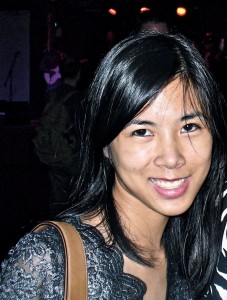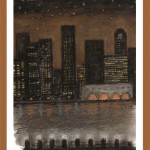
Jenna Le was born in Minneapolis, Minnesota, the youngest child of two Vietnam War refugees. She obtained her B.A. in mathematics from Harvard University and her M.D. from Columbia University. Her first book of poetry, Six Rivers, was published by New York Quarterly Books in August 2011. Her poems and translations of French poetry have been published by Barrow Street, The Brooklyn Rail, The Nervous Breakdown, Post Road, The Raintown Review, Salamander, Sycamore Review, and other journals.
***
LR: Many of the poems in Six Rivers riff on classical characters and themes while preserving a conversational use of language. Likewise, you often work in form while eschewing formal language. What do such dualities aim to achieve?

JL: Many of the characters in Greek mythology seem quite real to me, especially the sorceresses like Circe and Medea, who in my mind embody the tragicomic situation of the 21st-century woman who is brimming with intellectual resourcefulness but who is still anguished by her dating troubles. Like, I see Circe as a sort of precursor to Napoleon Dynamite: although she had plenty of “great skills….like nunchuck skills, bow-hunting skills, and computer-hacking skills,” she was still totally hapless when it came to romantic relationships. This is such a thoroughly modern theme that it only makes sense for me to talk about it in colloquial contemporary English.
I use traditional verse forms for much the same reason: because I feel they have a lot of relevance to our modern-day plight. The tanka, for example, is a verse form that was historically used by aristocratic Japanese poets to treat such subject matter as clandestine assignations with illicit lovers. Well, I always thought it would be interesting to repurpose this verse form and use it to address contemporary sexual practices that really don’t differ all that much from ancient ones (“hooking up,” etc.).
LR: There is a strong geographical trope in your book with literal journeys along rivers that are both real and fictional. How do these journeys serve your narrative?
JL: Well, immigration and displacement played big roles in my family history. All the journeys in my book recapitulate that, in a way. And, in a way, it’s this small-scale recapitulation of a large-scale narrative of escape, of striking out on one’s own in an unfamiliar and sometimes hypo-oxygenated territory, that drives the narrative of Six Rivers.
LR: Your poems often view myth, history and geography through the prism of the personal, that is, the speaker’s point of view as a Vietnamese American female physician. Tell us how you balance all those perspectives and what the melange confers to the politics of your storytelling.
JL: The “politics” of my storytelling are rooted in the personal, yes. My intent is not to make political statements per se, but to spin yarns and to massage language until it moans. I ask: is a poem in which a fictional couple contemplates having an abortion “political”? Or is it just another kind of love poem? (Or is it both?)
LR: There seems to be a tension between the natural and the unnatural, health and disease in your book. On the surface, this preoccupation appears to relate to your “day job”, but on a deeper level, what story does it tell?
JL: I’ve always had a somewhat morbid fascination with the unnatural, I guess. It’s something instinctual, universal, like how I involuntarily shudder when I see a peanut shell that contains more than two seeds. It’s a kind of rubbernecking, but a rubbernecking that looks inward as well as outward.
LR: What have your experiences been as a poet who identifies as both Asian American and female? Have you found that this has placed you into a “niche” in publishing, and if so, have you found this to be reductive or empowering?
JL: Yes, I occasionally find myself being labeled by other people as an “Asian-American poet” or “Asian-American female poet” (although perhaps not as often as I feel pressured to wear the label of “physician-poet”). These labels, obviously, don’t spring out of nowhere, and I’m somewhat complicit in their use: after all, it’s true that I write primarily from a female perspective and that my writing is inevitably inflected by my Asian heritage and my Asian-American upbringing, just as it is unavoidably influenced by my past job experiences and sundry other autobiographical factors. Still, when you get down to it, the stuff I try to write is poetry, not Asian-American female poetry.
I’m conflicted. On the one hand, like any female writer who’s ever used a male or neuter pseudonym (I’m thinking of Charlotte Bronte who published her first novel under the pseudonym “Currer Bell” in 1847, as well as of Joanne Rowling who published her first novel under the moniker “J.K. Rowling” 150 years later), I want my writing to be taken seriously for what it is, and I aspire for my writing to reach a large mixed audience.
On the other hand, I am cognizant of the fact that some of the people who have responded most warmly to the publication of my book have been Asians and Asian-Americans, and I am enormously grateful for their support and their exuberant expressions of fellow-feeling. Moreover, I remember how hard it was to grow up as a Vietnamese-American girl in the 1980s with relatively few Asian-American female poets to turn to as role models. (Correct me if I’m wrong, but I believe there are no Asian-American women represented in the Norton Anthology of Poetry to this very day.) If, by accepting the label of “Asian-American female poet,” I can help bolster the confidence of other aspiring young Asian-American female poets, I am happy to do it.
LR: With a BA in mathematics followed by an MD, your entry into the poetry world was unorthodox. How did you come to poetry and how did you navigate its murky waters?
JL: Literature was my first love. I began seriously reading and writing poetry as a preteen, in an effort to break free from the shackles of the sterile perfectionism that was threatening to ruin my life. In the years that followed, I continued reading poetry, writing poetry, taking poetry classes, and asking other poets for feedback on my writing. By exercising what meager time-management skills I possess, I was able to continue doing this in parallel with my other major life pursuits.
LR: Did you consider doing an MFA? Why did you choose not to, and how has that choice impacted your poetry career?
JL: I toyed with the idea of doing an MFA. In the end, it just didn’t jive with my other plans, temporally or financially or family-wise. Not doing an MFA has doubtless handicapped me, in terms of making connections, freeing up time for writing, etc. On the other hand, not “going the MFA route” has given me interesting life experiences, an increased amount of economic security, and an outsider’s perspective on po-biz, and I console myself with the delusion that these are worthwhile things to have.
LR: What advice would you give to poets who are trying to break into po-biz from the outside, both for journal and book publishing?
JL: When your work is truly ready to be published, betake yourself to the internet, which houses such helpful resources as duotrope and Jeffery Bahr’s online guide to print journals. These websites will give you a sense of which journals are a good fit for your work, as well as which journals have high visibility and will give you the best exposure. Keep tabs on other poets who are at a slightly more advanced stage in their career than you, but who have similar backgrounds or similar writing styles to you; make note of which journals they’ve been published in, and then submit your poems to those very same journals.
Based on my personal experiences which led up to the publication of Six Rivers, I believe that the importance of “making connections” can’t be underestimated. Don’t just schmooze with industry insiders at barbecues and book fairs, but actually give them time to get to know you, e.g., by volunteering as an editorial assistant for a literary magazine that you respect. Giving poetry readings is another good way to make yourself visible to well-placed people in the book-publishing field.
LR: What is your writing process?
JL: To me, the most important thing is making a commitment to sit down and work on my writing on a regular basis. I find it useful to set quantitative goals for myself: e.g., “I’m going to write at least 10 lines of poetry this evening.” Sometimes, when I find myself lacking “inspiration,” I ask current MFA students what writing assignments their workshop teachers have given them lately, and then I give them to myself as “homework.” I enjoy giving myself assignments that force me to step outside my comfort zone, be it in terms of subject matter or formal qualities.
Other times, I’ll aimlessly page through encyclopedias (Wikipedia is fair game!) and quietly take heed of which weird factoids grab my attention in spite of myself. Then I’ll try to use those loose strands to build the nest for a yet-to-be-hatched poem.
LR: In addition to original poems, you also do translations. Do you see them as different art forms? How do translating and multilingualism in general affect your own work?
JL: I view poems and translations as different art forms, albeit closely related ones: after all, isn’t it common practice nowadays for poets to do “homolinguistic translations” as a means of generating new original poems?
Doing translations has made me a more attentive reader of other people’s poetry, and it’s heightened my awareness of the subtle literary techniques that other writers use. It’s also brought me closer, emotionally, to such great writers as Nerval, Rimbaud, and Mallarmé.
One thought on “A Conversation with Jenna Le”